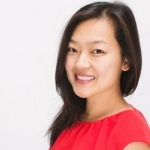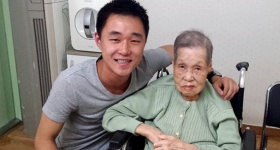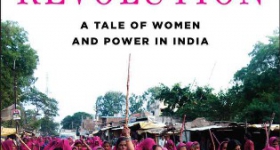Grace Lee Boggs: "I would say to a young activist, 'Do visionary organizing.'" Photo by Garrett MacLean
I had the fortune to interview long-time civil rights activist and writer Grace Lee Boggs via phone prior to her visit to the San Francisco Bay Area this week, where she will participate in at least three public events at Stanford, UC Berkeley and San Francisco’s Chinatown. Boggs, 96, may not be as well-known as other activists, but has more than seven decades of activism and grassroots organizing experience, including the labor, Civil Rights, black power, feminist, Asian American and environmental/food justice movements.
She lives in Detroit, MI and was married to late husband James Boggs, an African American autoworker, activist and philosopher. Along with other community members they co-founded Detroit Summer, a program that has helped rebuild the city from the ground up. In 2012, Detroit Summer will celebrate its 20th year.
She recently published The Next American Revolution: Sustainable Activism for the Twenty-first Century, written with Scott Kurashige. A documentary, American Revolutionary: The Evolution of Grace Lee Boggs by filmmaker Grace Lee (no relation) is in the works. To read more about her visit to the Bay Area, read the article I wrote for this week’s East Bay Express. Boggs also wrote about her most influential books for Hyphen’s Action issue in 2009.
I asked her about activism today and her experience as a Chinese American in a mostly black movement. Below is an edited version of the interview.
How are the issues facing Detroit similar to or different from ones in Oakland and other cities in this country?
The whole country is doing a lot of worrying about jobs, doing a lot of worrying about revolution, doing a lot of worrying about where do we go from here … I think for the first time in the country for a long time, there’s a sense that we are all in trouble, and that we all have to seek solutions.
In the video that you directly addressed to Occupy Wall Street protesters back in October, you said, “There's a long road ahead because you'll have the opportunity to create something new that's based on completely different values, but you're going to have to be thinking about values and not just about abuses.” What did you mean by this?
I think that the country is more aware that the issues we’re facing are not only economic, though they are very deeply economic, but a lot of values are involved as to how we regard ourselves as human brings and what we think is the role of education, what is the role of work, what is the role of relationships. I think all those questions are on the minds and in the hearts of people more than they were in the past. I think the values issue, the idea that higher wages or fancy clothes or bigger cars can make up for dehumanization, is not as popular today as it was in the past. I think people are asking much more profound questions of what it means to be a human being, in any other time that I can recall in the past.
I think that the old American Dream is dead and that creating a new dream is on the agenda in the hearts and minds of a whole lot of people, from very, very different backgrounds. These are questions that we have to resolve, and that no one is going to resolve for us.
What advice would you give to a young activist?
I would say to a young activist, ‘Do visionary organizing. Turn your back on protest organizing and recognize how that leads you more and more to defensive operations, whereas visionary organizing gives you the opportunity to encourage the creative capacity in people and it’s very fulfilling.’
Can you tell me about your involvement with the urban agricultural movement?
I was one of the founders of a program called Detroit Summer, which involved the young people in rebuilding, redefining and respiriting our city. That attracted the attention of African American elders who saw the vacant lots as an opportunity to grow food for the community … [It] brought young people from the city and African American elders together. That created a fantastic urban agricultural movement, which is one the fastest growing and most vibrant in the county, redefining what it is to be free by growing our own food and feeding ourselves.
How do you think being born a Chinese female has impacted your outlook on your life and your activism? (Boggs was born in 1915 in Providence, RI to Chinese immigrant parents).
I think being born a Chinese female helped a great deal to make me understand the profound changes necessary in the world. My mother never learned how to read and write because she born in a little Chinese village where there were no schools for females.
Because I was born in the United States, there was more opportunity for women in the United States that was very different from China. And as a result, she felt very envious of me for the opportunities that I had and this created a lot of tension between us. I don’t know whether that exists for Chinese or the Asian families that are coming here to the United States today. So that being born Chinese was not so much a question of being discriminated against because I was Chinese, though there’s some of that, but a sense that I had a different outlook on life. I had the idea, for example, from my father that a crisis is not only a danger but also an opportunity and that there is a positive and negative in everything. Being born Chinese meant a big deal to my life, I think.
I did not join any movement that was Asian because there was no Asian movement. There weren’t enough of us. There were so few of us, we were almost invisible until very late in the 20th century. I can remember when the idea of being Asian was born. Until the late 60s, we were Chinese or Japanese or Filipino. The idea that there was an Asian identity only came about at the end of the 1960s. We began to see ourselves more in numbers than in the past.
Did you form any friendships with other Asian activists since the 60s?
I was very fortunate here in Detroit, that we formed a group called the Asian American Political Alliance, which is made up of some Chinese, some Japanese. Some of the Chinese were born here, and some born in China. This gave us a sense of the diversity among Asians and also of an Asian identity. I think that was very important in my political development.
How did your parents view your marriage to an African American man, and your involvement in a mostly black movement?
Well, by the time Jimmy and I got married, I had been living away from home a long time. So they weren’t very much involved in my marriage. Toward the end of his life, my father lived with us for a while and he and James were very, very friendly and very close. My mother was living in Hawaii most of the time. I did not see her very much. By the time I left home, left New York in the middle 50s, my mother lived either in California or in Florida or in Hawaii with my brother so I did not see very much of her.
How do you maintain your Chinese identity over the years?
I’m not sure whether I maintained it. I don’t have only a Chinese identity. I see my identity as more that of an activist, as more that of a person who has worked with many different people, who has been a philosopher. I think that the ethnic identity has been useful and helpful and part of who I am but not what I am predominantly.
How do Asian Americans carve out a space in a country that still mostly sees race issues as black and white?
The opportunities are enormous for Asian Americans to be integrated or co-opted into the system. Fortunately, there’s been an Asian American movement that has sought to align itself with all people of color … The Asian American movement has an enormous amount of promise. But you have to make choices. You have to decide whether you’re going to take advantage of your ability to be cooperative with the system, or see how profound the contradictions in this system are. The challenge is, how do we create a more human society, how do we ourselves become more human?
--
Events info (updated)
Thursday, March 1: Grace Lee Boggs will be at a luncheon at Stanford University's Black House at noon.
Friday, March 2: “On Revolution: A Conversation Between Grace Lee Boggs and Angela Davis” takes place Friday, March 2nd at Pauley Ballroom, University of California, Berkeley from 4pm-6pm. Filmmaker Grace Lee (no relation) will screen a portion of American Revolutionary: The Evolution of Grace Lee Boggs, a documentary in progress. Admission is free and open to the public. To find out more about the 27th annual Empowering Women of Color Conference here.
Saturday, March 3: San Francisco-based nonprofit Chinese Progressive Association will honor Grace Lee Boggs on Saturday, March 3 at the Chinese Culture Center in Chinatown as part of the organization’s 40th year celebration. A book signing will follow. Event details here.
Momo Chang is a freelance journalist and features editor for Hyphen. Follow her on Twitter: @momochang_oak.










Comments